

July 9, 2010
“. . . I am the Alpha and the Omega, the First and the Last,” and, “What you see, write in a book and send it to the Seven Churches which are in Asia: to Ephesus, to Smyrna, to Pergamos, to Thyatira, to Sardis, to Philadelphia, and to Laodicea” (Revelation 1:11).
The History of God’s One and Only True Church
By
Alton (Don) B. Billingsley
Continued from 4-13-2010, 4-23-2010; 4-30-2010; 5-7-2010; 5-17-2010; 5-21-2010; 5-28-2010; 6-11-2010; 6-18-2010-6-25-2010; 7-2-2010
Regarding the establishment of His Church, Jesus Christ said to the apostle Peter and the rest of His disciples:
“. . . On this ROCK (Greek: Masculine, Petros, Feminine, Petra, meaning Jesus Christ Himself, Deuteronomy 32:3-4; I Corinthians 10:4) I will BUILD My Church, and the gates of Hades (graves, I Corinthians 15:54-55) shall NOT prevail against it.” (Matthew 16:18).
The Church in Thyatira - The Corrupt Church 1104 A.D. to approximately 1600 A.D.
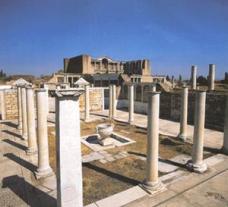
"And to the angel of the Church in Thyati'ra write: 'The words of the Son of God, who has eyes like a flame of fire, and whose feet are like burnished bronze. "'I know your works, your love and faith and service and patient endurance, and that your latter works exceed the first. But I have this against you, that you tolerate the woman Jez'ebel, who calls herself a prophetess and is teaching and beguiling my servants to practice immorality and to eat food sacrificed to idols. I gave her time to repent, but she refuses to repent of her immorality. Behold, I will throw her on a sickbed, and those who commit adultery with her I will throw into great tribulation, unless they repent of her doings; and I will strike her children dead. And all the churches shall know that I am he who searches mind and heart, and I will give to each of you as your works deserve. But to the rest of you in Thyati'ra, who do not hold this teaching, who have not learned what some call the deep things of Satan, to you I say, I do not lay upon you any other burden; only hold fast what you have, until I come." (Rev 2:16-25)
This Present Church Writing
A TRUE HISTORY of the TRUE
CHURCH
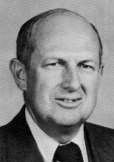
by Herman L. Hoeh
1959 edition
The Church in the Wilderness, Pages 20-23
John was inspired to commend the "Church at Thyatira" because the last works of the Church were more than the first. In the local Church there was a false woman teacher (symbol of a great Mother Church) who taught some to practice idolatry. Jesus warned He would cast them into great tribulation and "kill her children (Protestants) with death" unless they repented (Rev. 2:18-29).
Now let us notice how this description fits exactly the next great expansion of God's people.
As a result of the evangelization of the Alpine regions by the Paulicians and Bogomils of Bulgaria, as God's people were called, there arose numerous ministers and faithful congregations around 1000 A.D. One of these men was Peter de Bruys who preached the gospel of the Kingdom in the south of France (Jones' "Church History", ch. 4, sec. 3). Two other preachers of the time were Arnold and Henry. They were charged by the Catholic Church with remaining faithful to the whole law of God and of observing the Sabbath ("Ecclesiastical History", by Peter Allix, pp. 168-169).
T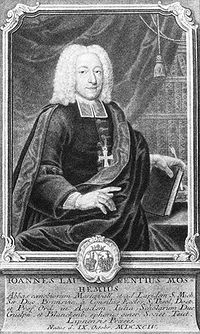 he
Lutheran historian Mosheim admits that the congregations of the
Church in the twelfth
century held "a
notion that the observance of the law of Moses, in everything except
the offerings of sacrifices, was obligatory upon Christians ... they
abstained from those meats the use of which was prohibited under the
Mosaic economy, and celebrated the Jewish Sabbath. The second tenet
which distinguished this sect was advanced in opposition to the
doctrine of three persons in the divine nature."
he
Lutheran historian Mosheim admits that the congregations of the
Church in the twelfth
century held "a
notion that the observance of the law of Moses, in everything except
the offerings of sacrifices, was obligatory upon Christians ... they
abstained from those meats the use of which was prohibited under the
Mosaic economy, and celebrated the Jewish Sabbath. The second tenet
which distinguished this sect was advanced in opposition to the
doctrine of three persons in the divine nature."
Yes, they knew that God was not a trinity, but a family!
A crusade was instituted against many of these people in Southern France. Thousands perished. But when it seemed that the FIRST WORK WOULD SOON BE ENDED, there arose an even GREATER leader among God's people.
I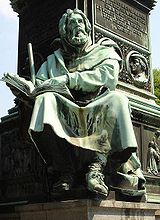 t
was the close of the twelfth century. In Lyons, France, lived an
astonishingly successful and wealthy merchant, Peter Waldo. "One
day, while in the company of some of the leading citizens, one of his
friends fell lifeless at his side. Terrified by the event, he said to
himself: If death had stricken me, what would have become of my
soul?"
t
was the close of the twelfth century. In Lyons, France, lived an
astonishingly successful and wealthy merchant, Peter Waldo. "One
day, while in the company of some of the leading citizens, one of his
friends fell lifeless at his side. Terrified by the event, he said to
himself: If death had stricken me, what would have become of my
soul?"
Being a Catholic, Waldo asked one of these theologians what is the PERFECT way. 'Ah!' answered the theologian ... 'here is Christ's precept': '"If thou wilt be perfect, go, sell that thou hast and give to the poor, and thou shalt have treasure in heaven, and come take up thy cross and follow me."'" (Comba, "History of the Waldenses", p. 21).
Waldo disposed of his property by distributing to the poor. But from his wealth he also had a translation of the Scriptures made. In this translation he noticed the command to the apostles to preach the gospel of the Kingdom of God. His mind began to understand the Scriptures.
God was using Peter Waldo.
Comba says that "he brought to the study of the Scriptures that practical common sense which had guided him in his business transactions ... The word of Christ was clear enough, for Waldo it was simply a question of furnishing a literal translation" (p. 243 of Comba's "History").
The humble remnant of the Church of God listened to him. Soon many new disciples were coming to repentance. "His disciples became almost as many CO-WORKERS for him" (p. 26). The world called them Waldenses.
God's Church was once again spreading the gospel! A SCHOOL FOR MINISTERS WAS ESTABLISHED TO PROVIDE THE TRAINED HELP TO CARRY THE GOSPEL.
Called the "Church of God"
Here is a marvelous record from these people, still preserved, dated 1404: "We do not find anywhere in the writings of the Old Testament that the light of truth and of holiness was at any time completely extinguished. There have always been men who walked faithfully in the paths of righteousness. Their number has been at times reduced to a few; but has never been altogether lost. We believe that the same has been the case from the time of Jesus Christ until now; and that it will be so unto the end. FOR IF THE CHURCH OF GOD WAS FOUNDED, IT WAS IN ORDER THAT IT MIGHT REMAIN UNTIL THE END OF TIME ... We do not believe that the Church of God absolutely departed from the way of truth; but one portion yielded, and, as is commonly seen, the majority was led away to evil." (Quoted in Comba's "History", pp. 10-11.)
Their enemies admitted that these people proclaimed the gospel of the Kingdom of God, that they baptized repentant believers and obeyed the WHOLE law of God.
B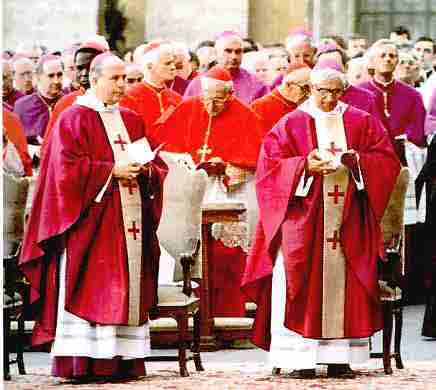 ut
just as there was a false teacher, Jezebel, in the local church
at Thyatira so now there were many FALSE teachers and FALSE brethren
among these people. Some rose up among the Waldenses teaching that it
was right to have Catholics, and later, Protestants, baptize their
children and to attend IDOLATROUS mass once in a while. Others
committed spiritual fornication by meddling in politics in the hope
of avoiding persecution.
ut
just as there was a false teacher, Jezebel, in the local church
at Thyatira so now there were many FALSE teachers and FALSE brethren
among these people. Some rose up among the Waldenses teaching that it
was right to have Catholics, and later, Protestants, baptize their
children and to attend IDOLATROUS mass once in a while. Others
committed spiritual fornication by meddling in politics in the hope
of avoiding persecution.
To correct His people God caused a frightful crusade to pass over them about 300 years after the death of Waldo. Only a faithful remnant escaped.
Once again we see the repeated fact that after a few generations, the local congregations are no longer composed of truly converted brethren, but of unconverted children and half-hearted believers who either go aside into total error in the face of persecution or else are forced to give up their lives for the faith, as Daniel prophesied.
But in 1315 A.D., long before the crusade against the Waldenses occurred, the truth of God was carried to England by a German Waldensian preacher, Walter Lollard. It took deep root for a while until the Protestant Reformation.”
End of quotes from Dr. Herman L. Hoeh’s Booklet
Ambassador
College
Church
History
Lecture 22
Lollards / Anabaptists / Sabbatarians
I.
GROUPS WITHIN THE REFORMATION PERIOD
A.
Lollards.
1.
Located in Holland in the 1300's, predating Wesley.
2. Word origin:
a. Lollen - meaning to
speak softly
or to mumble
b.
Later called Lollards
3.
Tended to memorize scriptures.
4.
Remnant of Waldenses.
The Encyclopedia of Religious Knowledge, by Brown says:
"Lollards: A Religious sect, differing in many points from the church of Rome, which arose in Germany about the beginning of the 14th century. (They were possibly named after their) leader and champion, a native of Memtz and equally famous for his eloquence and his writings, ... (Walter Lollard) was burnt at Cologne. Others think that Lollard was...merely a name of reproach applied to all heretics who concealed what was deemed error under the appearance of piety. The monk of Canterbury derives the origin of the word Lollard from Lollium, a tare, as if the Lollards were the tares sown in Christ's vineyard. Abeli says that the word signifies 'praising God' from the German word 'lobin' to praise and cheer the Lord, because the Lollards employed themselves in traveling about from place to place singing Psalms and hymns. Others much to the same purpose derived Lollard, Lullhard or Lollart, Lullart, as it was written by the ancient German word Lullin, Lollin or Lallin and the termination 'hard' with which many of the high Dutch words end. Lollin signified to sing with a low voice and therefore, Lollard is a singer or one who frequently sings and in the vulgar tongue of the Berman it denotes one who is continually praising God with a song or singing hymns to His honor." p.752
The Encyclopedia of Religious Knowledge says:
"Fuller, however, informs us that in the reign of Edward III about A.D. 1315, Walter Lollard, was a German preacher. Perin in his history of the Waldensians calls him, 'one of the Waldensian barbs of great renown among them came into England and who was so eminent in England, that as in France, they called Beringarians from Beringarious and Petrobrucians from Peter De Bruys and in Italy and Flanders, Arnoldists from the famous Arnold of Brecia. So did the Waldensians Christians for many generations after, bear the worthy name of this man being called Lollards." p.538”
The Encyclopedia Britannica, 11th edition, says:
"In the earlier stages of Lollardy, when the court and the clergy managed to bring Lollards before ecclesiastical tribunals backed by the civil power, the accused generally recanted and showed no disposition to endure martyrdom for their opinions. They became bolder in the beginning of the 15th century.... In 1410 John Badby, an artisan, was sent to the stake. His execution was memorable from the part taken in it by the Prince of Wales, who himself tried to reason the Lollard out of his convictions. But nothing said would make Badby confess that 'Christ sitting at supper did give to His disciples His living body to eat.'"P.930
f. Some of their doctrines
The Encyclopedia Britannica, 11th edition, says:
“Thomas Bagley (a Lollard) was accused of declaring that if in the sacrament a priest made bread into God, he made a God that can be eaten by rats and mice; that the Pharisees of the day, the monks, and the nuns, and the friars and all other privileged persons recognized by the church were limbs of Satan; and that auricular confession to the priest was the will not of God but of the devil." p.931
"The opinions of the later Lollards can best be gathered from the learned and unfortunate Pecock, who wrote his elaborate REPRESSOR against the 'Bible-men," as he calls them. He summed up their doctrines under eleven heads: they condemn the having and using images in the churches, the going on pilgrimages to the memorial or 'mynde places' of the saints, the holding of landed possessions by the clergy, the various ranks of the hierarchy, the framing of ecclesiastical laws and ordinances by papal and episcopal authority, the institution of religious orders, the costliness of ecclesiastical decorations, the ceremonies of the mass and the sacraments, the taking of oaths and the maintaining that war and capital punishment are lawful. When these points are compared with the Lollard Conclusions of 1395, it is plain the Lollardy had not greatly altered its opinions after fifty-five years of persecution." p. 931
g. Had a great impact on England
The Encyclopedia Britannica, 11th edition, says:
"Lollardy, which continued down to the Reformation, did much to shape the movement in England. The subordination of clerical to laic jurisdiction, the reduction in ecclesiastical possessions, the insisting on a translation of the Bible which could be read by the 'common' man were all inheritances bequeathed by the Lollards." p. 931
(To be continued)
In the next writing, the history of the Thyatira Church Era will be continued by another Church history writer that will fill in some of the details that were not covered in the in the above writings.
http://bodyofchristonline.us/ http://cog-ff.com http://www.ezekielwatchman.org/
